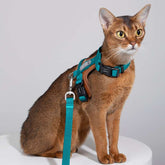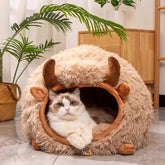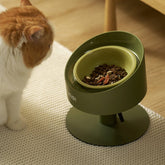Essential Tips for First-Time Cat Owners: A Beginner's Guide

Are you about to embark on the journey of being a first-time cat owner? Congratulations! Welcoming a furry friend into your home is an exciting and rewarding experience. However, it's essential to be well-prepared and equipped to provide the best care for your new feline companion. In this beginner's guide, we'll explore some valuable tips to help you navigate the joys and responsibilities of cat ownership.
Preparing Your Home for Your New Cat or Kitten
Creating a Safe and Welcoming Space
-
Set up a small, quiet room where your new cat or kitten can feel secure during their initial days at home. This room will serve as their haven while they adjust to their new environment.
-
Ensure we equipped the room with essential items such as food and water bowls, a litter box and a cozy bed or blanket. These familiar comforts will help them settle in more easily.
Cat-Proofing Your Home
-
Conduct a thorough inspection of your home to identify potential hazards. Secure loose cords, remove toxic plants, and safeguard small objects that could be swallowed.
-
Consider blocking off access to certain rooms or areas until your cat or kitten becomes more familiar with their surroundings.
-
Cats are curious climbers, so ensure all windows and balconies are securely screened or closed to prevent any accidental falls.
-
If you're concerned about bad smells at home, consider using a fully enclosed litter box. However, remember that kittens might require some training to adapt to it. Another option is using an air deodorizer specifically designed for eliminating cat odors.

Enriching the Environment
-
Cats love to explore and climb, so consider providing vertical spaces such as cat trees, shelves, or window perches. These elevated areas will give your cat or kitten a sense of territory and allow them to observe their surroundings from a higher vantage point.
-
Incorporate interactive toys, scratching post, and toys that encourage natural behaviors like hunting and pouncing. This will keep your cat mentally stimulated and provide an appropriate outlet for their scratching instincts.
-
Create cozy hideouts and hiding places using cat tunnels, boxes, or beds placed in quiet corners. These spaces offer privacy and security for your cat to retreat to when they feel the need to rest or observe from a distance.
Interacting and Exercising with Your Cat
Engage in Daily Play Sessions: Cats are naturally curious and playful creatures, and regular playtime is essential for their physical and mental stimulation. Set aside at least 15 minutes every day to engage in interactive play with your cat. Experiment with different types of toys to find what captures their interest the most.
Choose the Right Toys
Consider toys for cats that simulate prey-like movements, such as wand toys with feathers or small plush mice. Laser pointers can also be entertaining for cats but remember to never shine the laser directly into their eyes.
Encourage Natural Hunting Behaviors
Encourage your cat to engage in activities that allow them to exhibit their natural hunting instincts. You can hide treats around the house or use interactive cat toys that require them to figure out how to access their food. This mental stimulation is vital for their overall well-being.
Observe and Adapt to Your Cat's Preferences
Observe your cat's preferences during playtime. Some cats may prefer chasing toys, while others enjoy pouncing or batting at objects. Adjust your play style accordingly to keep them engaged and entertained. Remember to end each play session with a calm activity, such as gentle petting or brushing, to help them wind down.

Protecting Furniture from Scratches
Provide Appropriate Scratching Surfaces
Cats have an instinct to scratch, which helps them maintain healthy claws and mark their territory. Instead of trying to discourage scratching altogether, provide alternatives to protect your furniture.
Using Positive Reinforcement for Behavior Modification
Enhance your cat's scratching experience with the cat-scratch-sisal-mat, a durable and engaging scratcher made from top-notch sisal rope or cardboard. This innovative mat offers a generous height, allowing your feline companion to indulge in a full-body stretch while satisfying their scratching instincts. Strategically position the cat-scratch-sisal-mat in your cat's favorite areas or near furniture they are prone to scratching, providing them with an enticing and appropriate outlet for their natural behaviors.
Temporary Deterrents for Furniture
To entice your cat to use the scratching surface, sprinkle catnip or use interactive toys on or near it. Whenever you catch your cat attempting to scratch furniture, redirect its attention to the appropriate surface by gently placing its paws on it and praising them. Positive reinforcement is key to teaching them where it's acceptable to scratch.

Caring for Your Cat's Skin
Watch for Skin Problems
Cats are susceptible to various skin conditions, and it's essential to monitor their skin health regularly. Keep an eye out for signs such as excessive itching, redness, swelling, scabs, or hair loss. Additionally, check for the presence of fleas, ticks, or other parasites.
Consulting Your Veterinarian for Evaluation
If you notice any concerning symptoms or changes in your cat's skin, it's crucial to consult your veterinarian promptly. They can perform a thorough examination, identify the underlying cause, and recommend appropriate treatment options.
Prevention and Treatment of Fleas
Flea Prevention: Fleas are common pests that can cause discomfort and health issues for your cat. A monthly spot-on treatment is an effective way to prevent flea infestations and keep your cat protected year-round.
Regular Monitoring and Follow-Up Care
Consult with your veterinarian to select a suitable flea prevention product for your cat's specific needs.
They can recommend spot-on treatments that not only eliminate fleas but also target other parasites like ticks or mosquitoes, which can transmit diseases.
Remember to follow the instructions provided with the spot-on treatment carefully. Apply the product to the skin between your cat's shoulder blades, ensuring they cannot lick it off. Regularly monitor your cat for any signs of flea infestation, such as excessive scratching or visible fleas, and consult your veterinarian if necessary.
By implementing these tips, you can ensure your cat stays physically and mentally stimulated, protect your furniture from scratches, and maintain your cat's skin health.

Conclusion
Being a first-time cat owner can be a delightful and fulfilling experience with the right knowledge and preparation. By following these essential tips, you can create a nurturing environment, foster a strong bond, and ensure the well-being of your feline companion. Remember, every cat is unique, so observe and respond to their individual needs. Enjoy this remarkable journey with your new furry friend!























